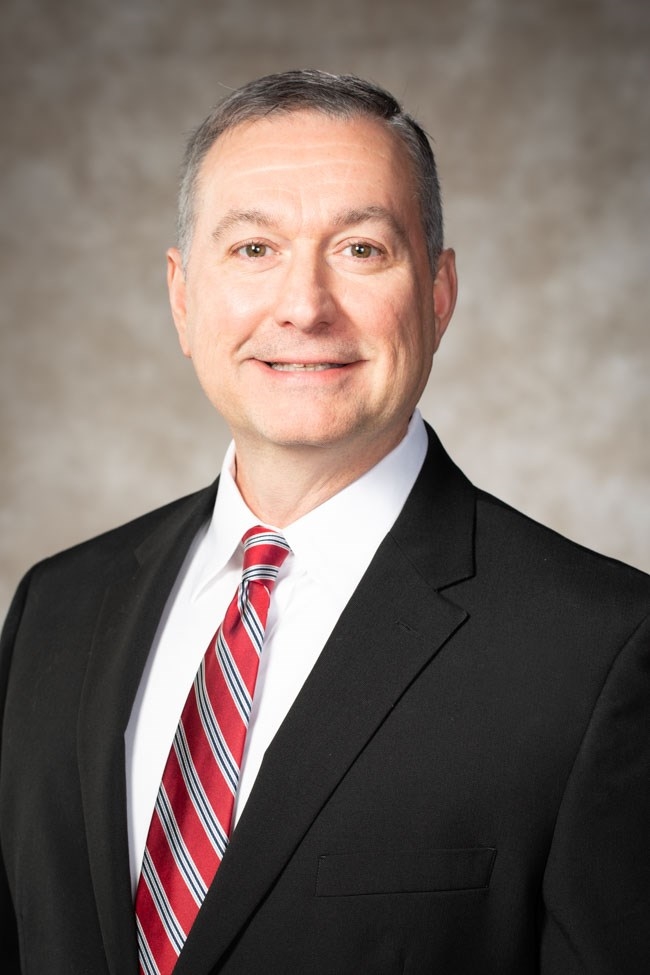
FAYETTEVILLE, Ark. – Lance Cheramie, instructor in apparel merchandising and product development, has been selected to participate in the first virtual Climate Reality Leadership Corps Global Training program, which will help him further address environmental issues throughout the apparel supply chain with students.
The program, Aug. 28-Sept. 3, is sponsored by The Climate Reality Project, which was founded by former U.S. Vice President Al Gore.
The training brings focuses on practical skills for effectively driving climate action and contributing to a diverse, equitable and inclusive movement for solutions, even during this current time of social distancing.
Cheramie earned his Ph.D. in public policy with a specialization in sustainability. He incorporates sustainability into the apparel concentration, which is part of the School of Human Environmental Sciences in the Dale Bumpers College of Agricultural, Food and Life Sciences.
"Throughout this training, I will be able to gather information that will be shared with students and the NWA community," said Cheramie. "It will allow me to have a greater understanding of climate change that could shape public opinion, inspire actions and lead the global fight for climate solutions."
In AMPD, students learn about the fashion lifecycle from cradle to grave. Overall, the fashion industry could be responsible for up to 10 percent of all global carbon emissions and nearly 20 percent of wastewater.
"Sustainability lectures usually stir up great conversation among students, even by some who are typically quiet," said Cheramie. "Every stage in the production of a garment threatens the planet and its resources. For example, to produce one kilogram of cotton (amount needed for one pair of jeans) requires 20,000 liters of water. In addition, 24 percent of all insecticides and 11 percent of all pesticides are used in the universal production of cotton, which adversely affects air, soil and water quality. Several different chemicals are used in the dyeing and finishing processes involved in turning raw materials into fabric. These chemicals can potentially harm the environment if not disposed of properly. Approximately 70 million barrels of oil are used each year to produce the world's synthetic polyester fiber."
Cheramie said it takes more than 200 years for polyester to decompose, which increases the environmental impact associated with the industry; and plastic microfibers from apparel products, made from polyester, are often discarded into the water supply, accounting for 85 percent of manufactured material found along oceans.
"This pollution affects marine wildlife, and eventually affects our food supply," said Cheramie. "The students are our future and only they can help us make a difference in the world."
Participants will hear messages from Gore and others; take part in virtual panel discussions and small group conversations; complete exercises exploring links between the climate crisis and public health, rebuilding economies with green jobs and clean energy, and the importance of ensuring a just, low-carbon transition with concern for human rights and social justice.
Since 2006, Climate Reality has trained more than 21,000 Climate Reality leaders from 154 countries.
Climate Reality has 10 branch offices around the world and approximately 130 local chapters throughout the United States.
Even as air pollution levels and carbon emissions have seen recent reductions around the world, according to The Climate Reality Project, 2020 is on track to be the warmest year on record. Failing to simultaneously address the climate crisis and the COVID-19 pandemic could have catastrophic impacts on public health, the environment, and our collective future.
"The COVID-19 pandemic gives us a sobering picture of what failing to prepare for, and properly respond to, the climate crisis looks like: massive and devastating disruptions to the global economy, public health and all aspects of our lives," said Gore. "However, we have also seen the global community's incredible ability to come together to solve an existential threat, while working toward a recovery guided by a vision for a more resilient future. Together, we can take lessons learned from the pandemic and translate them to ambitious climate solutions centered in community, equity, and opportunity for all."
About the Dale Bumpers College of Agricultural, Food and Life Sciences: Bumpers College provides life-changing opportunities to position and prepare graduates who will be leaders in the businesses associated with foods, family, the environment, agriculture, sustainability and human quality of life; and who will be first-choice candidates of employers looking for leaders, innovators, policy makers and entrepreneurs. The college is named for Dale Bumpers, former Arkansas governor and longtime U.S. senator who made the state prominent in national and international agriculture. For more information about Bumpers College, visit our website, and follow us on Twitter at @BumpersCollege and Instagram at BumpersCollege.
About the University of Arkansas: The University of Arkansas provides an internationally competitive education for undergraduate and graduate students in more than 200 academic programs. The university contributes new knowledge, economic development, basic and applied research, and creative activity while also providing service to academic and professional disciplines. The Carnegie Foundation classifies the University of Arkansas among only 2.7 percent of universities in America that have the highest level of research activity. U.S. News & World Report ranks the University of Arkansas among its top American public research universities. Founded in 1871, the University of Arkansas comprises 10 colleges and schools and maintains a low student-to-faculty ratio that promotes personal attention and close mentoring.
Topics
Contacts
Robby Edwards, director of communications
Dale Bumpers College of Agricultural, Food and Life Sciences
479-575-4625,